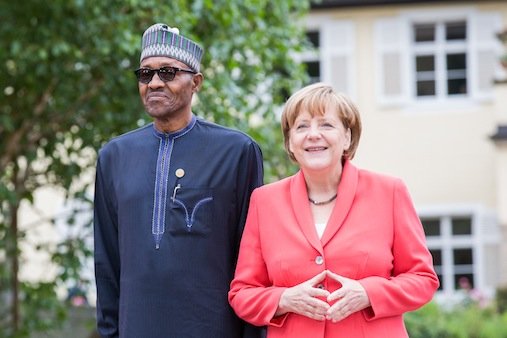
During the visit of the Chancellor of Germany Angela Merkel to Nigeria, Volkswagen took the opportunity to sign a Memorandum of Understanding (MoU) in the presence of both the Chancellor and His Excellency, President of the Federal Republic of Nigeria, Muhammadu Buhari in Abuja to develop a joint vision for an automotive hub in that country. The Head of Volkswagen Sub-Saharan Region, Thomas Schaefer signed the agreement on behalf of Volkswagen with the Nigeria’s Minister of Industry, Trade and Investment, Dr. Okey Enelamah.
The Volkswagen Brand thus took the next step in expanding its influence and presence in Sub-Saharan Africa. This comes a day after the signing of the MoU in Ghana in the presence of Chancellor Merkel and Vice President of Ghana, Mahamudu Bawumia whereby Volkswagen committed to set up a vehicle assembly and conduct a detailed feasibility study for the development of an integrated Mobility Solution in Ghana.
In the MoU, Volkswagen undertakes to implement a phased approach in relation to the assembly of vehicles, initially from assembly kits with the long term view of establishing Nigeria as an automotive hub on the West Coast of Africa. This will include establishing a training academy in conjunction with the German Government, which will train the initial employees. The academy will also provide broader technical training in automotive skills. It is also intended that a comprehensive Volkswagen vehicle and service network is developed in the country subject to commercial viability.
In turn the Nigerian Government undertakes to accelerate the approval of the Nigerian Automotive Policy, currently under consideration. This includes the gradual transition from the importation of used cars to the manufacture and distribution of new passenger vehicles.
The Government has committed to providing a conducive legislative environment that will encourage the manufacturing of motor vehicles in Nigeria.
Nigeria’s Minister of Industry, Trade and Investment, Dr. Okey Enelamah, who signed on behalf of his government, said: “The MoU is a major step in our walk towards the development of the automotive industry to achieve its potential contribution to the continuous economic development of the country.”
“We believe in the strategic and catalytic role of the automotive industry in the diversification of the Nigerian economy and we remain committed to encouraging and partnering with relevant stakeholders, especially investors and friends of Nigeria. Our overall objective is to restore assembly and develop local content, thereby creating employment, acquiring technology and reducing pressure on the country’s balance of payment, ” added Dr. Enelamah
Thomas Schaefer commented: “This week Volkswagen has been able to demonstrate with conviction that it is serious about its intentions in Sub-Saharan Africa. We are well placed to become a dominant player in Africa, as the continent continues to stabilise and develop economically, as the last frontier for the automotive industry.”
Volkswagen has a fully-fledged manufacturing facility in South Africa, and assembles vehicles in Kenya, Algeria as well as in Rwanda, in conjunction with an Integrated Mobility Solution offering Community Car Sharing and shortly to be launched Ride Hailing.
Under its TRANSFORM 2025+ brand strategy, Volkswagen is strengthening the regions and focusing on new up-and-coming markets. Alongside North and South America as well as China, the Sub-Sahara region plays an increasingly important role. Although the African automotive market is comparatively small today, the region could develop into an automotive growth market of the future.
Volkswagen will continue to grow its importer network in Sub-Saharan Africa and explore other opportunities for growth and development. As a next step, exploratory talks are being held with the Government of Ethiopia.
“We are only starting with our initiatives in Africa and will continue to develop sales and service networks where applicable. We are also looking at future assembly locations to determine if the markets have the potential and the necessary policy frameworks to be developed, to accommodate vehicle assembly,” added Schaefer.
Thomas Schaefer is also the President of the Association of African Automobile Manufacturers and stated in his capacity as the President that he believed that it was important that a Pan African Auto pact be developed to promote and grow a connected Auto Industry in Africa.
“Africa’s time is now and with good alignment between the African countries with automotive aspirations we can create intra African trade and a Win-Win situation for all,” concluded Schaefer.
END

Be the first to comment